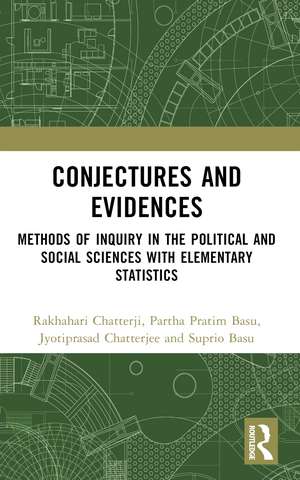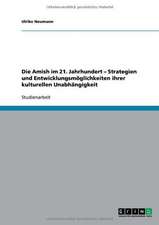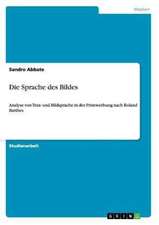Conjectures and Evidences: Methods of Inquiry in the Political and Social Sciences with Elementary Statistics
Autor Rakhahari Chatterji, Partha Pratim Basu, Jyotiprasad Chatterjee, Suprio Basuen Limba Engleză Paperback – 29 noi 2024
The methods discussed include aggregate data analysis, the method of survey research, experimental and quasi-experimental research designs, participant observation, content analysis, and focus groups study. In a separate chapter the issue of quantitative and qualitative research methods and their uses has been discussed. An attempt has been made to assess these methods especially from the point of view of their adoption and application by social scientists working in the developing economies.
Print edition not for sale in South Asia (India, Sri Lanka, Nepal, Bangladesh, Pakistan or Bhutan)
| Toate formatele și edițiile | Preț | Express |
|---|---|---|
| Paperback (1) | 261.59 lei 3-5 săpt. | +33.30 lei 7-11 zile |
| Levant – 29 noi 2024 | 261.59 lei 3-5 săpt. | +33.30 lei 7-11 zile |
| Hardback (1) | 1015.26 lei 6-8 săpt. | |
| Levant – 23 iun 2023 | 1015.26 lei 6-8 săpt. |
Preț: 261.59 lei
Nou
Puncte Express: 392
Preț estimativ în valută:
50.06€ • 51.72$ • 41.66£
50.06€ • 51.72$ • 41.66£
Carte disponibilă
Livrare economică 04-18 martie
Livrare express 18-22 februarie pentru 43.29 lei
Preluare comenzi: 021 569.72.76
Specificații
ISBN-13: 9781032526843
ISBN-10: 103252684X
Pagini: 392
Ilustrații: 31
Dimensiuni: 138 x 216 x 24 mm
Greutate: 0.73 kg
Ediția:1
Editura: Levant
Colecția Routledge
ISBN-10: 103252684X
Pagini: 392
Ilustrații: 31
Dimensiuni: 138 x 216 x 24 mm
Greutate: 0.73 kg
Ediția:1
Editura: Levant
Colecția Routledge
Public țintă
Academic, Postgraduate, and Undergraduate CoreCuprins
Preface
List of Tables
List of Figures
PART I
1. Research Srategies: Quantitative and Qualitative
Theory, Epistemological Concerns and Ontological Questions
Trajectories of Quantitative and Qualitative Research
Data and Data Collection Techniques in Quantitative and Qualitative Research
Major Preoccupations of Quantitative and Qualitative Researchers
Critique of Quantitative and Qualitative Research
2. Research Methodology: Concepts Hypotheses and Variables
Why learn methodology?
Concepts, Hypotheses and Variables
3. Research Designs: Experimental and Quasi Experimental
J.S. Mill and the Experimental Method
The Experiment
Experimental Designs
Quasi-Experimental Designs
4. Aggregate Data Analysis
What are Aggregate Data?
Sources of Aggregate Data?
Uses of Aggregate Data
Analysis of Aggregate Data
5. Survey Research: Data and Analysis
Definition, Origin and Development of Survey Research
Techniques of Survey Research
Survey Data Analysis
Problems and Limitations of Survey Research
Conclusions: Some Solutions to the Problem of Survey Research
6. Content Analysis
History of Content Analysis
Definition and Nature of Content Analysis
Description of the Technique
Examples of Content Analysis
Qualitative-Quantitative Continuum in Content Analysis
Assessment of Content Analysis
7. The Logic and the Practice of Participant Observation
Meaning Understanding and Sociology
Meaning Understanding and Social Anthropology
Participation and Understanding the Political Process
Participant Observation: How to Practice It
8. Focus Group Research
History of Focus Group Research
Nature and Types of Focus Group Research
Description of the Technique
Examples of Focus Group Research
Focus Group Discussion as a Standalone Method?
Focus Group, Participant Observation and Interview: A Comparative Assessment
PART II
9. Measurement: the Cornerstone of Research
Levels or Scales of Measurement:
Nominal scale
Ordinal scale
Interval scale
Ratio scale
10. Organizing the Data: Frequency Distribution
Frequency Distribution of Nominal Data
Frequency Distribution of Ordinal Data
Frequency Distribution of Interval/Ratio Data
Cumulative Frequency and Cumulative Percentage
Application of the Method of Simple Interpolationxi
11. Measures of Central Tendency
Mode,
Median (Quartiles, Deciles, Percentiles)
Arithmetic Mean
Choosing an Appropriate Measure of Central Tendency
Exercise
12. Measures of Dispersion
Range
Mean Deviation
Quartile Deviation
Standard Deviation
Selecting the Best Measure of Dispersion
Relative Measures of Dispersion
Skewness
Exercise
13. Correlation and Regression
Strength of Association
Direction of Association
Correlation Coefficient
Regression
Properties of Linear Regression
Exercise
14. Nonparametric Measures of Correlation
Spearman’s Rank Correlation Coefficient
Phi Correlation Coefficient
Chi Square
Contingency Correlation Coefficient
Cramer’s V
Exercise
List of Important Formulas
Bibliography
Index
List of Tables
List of Figures
PART I
1. Research Srategies: Quantitative and Qualitative
Theory, Epistemological Concerns and Ontological Questions
Trajectories of Quantitative and Qualitative Research
Data and Data Collection Techniques in Quantitative and Qualitative Research
Major Preoccupations of Quantitative and Qualitative Researchers
Critique of Quantitative and Qualitative Research
2. Research Methodology: Concepts Hypotheses and Variables
Why learn methodology?
Concepts, Hypotheses and Variables
3. Research Designs: Experimental and Quasi Experimental
J.S. Mill and the Experimental Method
The Experiment
Experimental Designs
Quasi-Experimental Designs
4. Aggregate Data Analysis
What are Aggregate Data?
Sources of Aggregate Data?
Uses of Aggregate Data
Analysis of Aggregate Data
5. Survey Research: Data and Analysis
Definition, Origin and Development of Survey Research
Techniques of Survey Research
Survey Data Analysis
Problems and Limitations of Survey Research
Conclusions: Some Solutions to the Problem of Survey Research
6. Content Analysis
History of Content Analysis
Definition and Nature of Content Analysis
Description of the Technique
Examples of Content Analysis
Qualitative-Quantitative Continuum in Content Analysis
Assessment of Content Analysis
7. The Logic and the Practice of Participant Observation
Meaning Understanding and Sociology
Meaning Understanding and Social Anthropology
Participation and Understanding the Political Process
Participant Observation: How to Practice It
8. Focus Group Research
History of Focus Group Research
Nature and Types of Focus Group Research
Description of the Technique
Examples of Focus Group Research
Focus Group Discussion as a Standalone Method?
Focus Group, Participant Observation and Interview: A Comparative Assessment
PART II
9. Measurement: the Cornerstone of Research
Levels or Scales of Measurement:
Nominal scale
Ordinal scale
Interval scale
Ratio scale
10. Organizing the Data: Frequency Distribution
Frequency Distribution of Nominal Data
Frequency Distribution of Ordinal Data
Frequency Distribution of Interval/Ratio Data
Cumulative Frequency and Cumulative Percentage
Application of the Method of Simple Interpolationxi
11. Measures of Central Tendency
Mode,
Median (Quartiles, Deciles, Percentiles)
Arithmetic Mean
Choosing an Appropriate Measure of Central Tendency
Exercise
12. Measures of Dispersion
Range
Mean Deviation
Quartile Deviation
Standard Deviation
Selecting the Best Measure of Dispersion
Relative Measures of Dispersion
Skewness
Exercise
13. Correlation and Regression
Strength of Association
Direction of Association
Correlation Coefficient
Regression
Properties of Linear Regression
Exercise
14. Nonparametric Measures of Correlation
Spearman’s Rank Correlation Coefficient
Phi Correlation Coefficient
Chi Square
Contingency Correlation Coefficient
Cramer’s V
Exercise
List of Important Formulas
Bibliography
Index
Notă biografică
Rakhahari Chatterji was Professor in Political Science and Dean of the Faculty of Arts at the University of Calcutta. Books written by him include Working Class and the Nationalist Movement in India, Introduction to Comparative Political Analysis, Gandhi and the Ali Brothers-Biography of a Friendship (translated in Hindi and Marathi). Apart from editing a number of volumes he has contributed over a hundred papers to academic journals and newspapers. Currently, he is Honourary Distinguished Fellow at the Observer Research Foundation, Kolkata.
Partha Pratim Basu is Professor of International Relations at Jadavpur University, and also Executive President, Jadavpur Association of International Relations, Kolkata. He has also served as Editor, Jadavpur Journal of International Relations; Coordinator, One-year PG Diploma Course on Human Rights; and Director, School of Media, Communication and Culture, Jadavpur University. He has long experience of teaching Research Methodology in M. Phil and PhD course work classes.
Jyotiprasad Chatterjee is Associate Professor in the Department of Sociology, Barrackpore Rastraguru Surendranath College, West Bengal, India. His research interest includes social movements arising in and through the critical interface of democracy and development. As the Supervisor of West Bengal of CSDS- Lokniti-network, he has been associated with a number of survey based research projects and has developed a considerable expertise in managing and handling empirical data.
Suprio Basu is Assistant Course Director, Rural Awareness and Self Employment, Department of Sociology, University of Kalyani, West Bengal, India. His research area includes democratic governance, policy research with a focus on democratic decentralisation, electoral behaviour and so on. Being the CSDS Lokniti’s West Bengal State Coordinator for the last two decades he has provided able leadership to a number of empirical research and has developed a unique skill in quantitative data analysis
Partha Pratim Basu is Professor of International Relations at Jadavpur University, and also Executive President, Jadavpur Association of International Relations, Kolkata. He has also served as Editor, Jadavpur Journal of International Relations; Coordinator, One-year PG Diploma Course on Human Rights; and Director, School of Media, Communication and Culture, Jadavpur University. He has long experience of teaching Research Methodology in M. Phil and PhD course work classes.
Jyotiprasad Chatterjee is Associate Professor in the Department of Sociology, Barrackpore Rastraguru Surendranath College, West Bengal, India. His research interest includes social movements arising in and through the critical interface of democracy and development. As the Supervisor of West Bengal of CSDS- Lokniti-network, he has been associated with a number of survey based research projects and has developed a considerable expertise in managing and handling empirical data.
Suprio Basu is Assistant Course Director, Rural Awareness and Self Employment, Department of Sociology, University of Kalyani, West Bengal, India. His research area includes democratic governance, policy research with a focus on democratic decentralisation, electoral behaviour and so on. Being the CSDS Lokniti’s West Bengal State Coordinator for the last two decades he has provided able leadership to a number of empirical research and has developed a unique skill in quantitative data analysis
Descriere
This book examines some of the major and most commonly used methods and statistics necessary for social science research. It is meant primarily for the beginners, and hence does not require any prior training in research methodology or statistics.





















